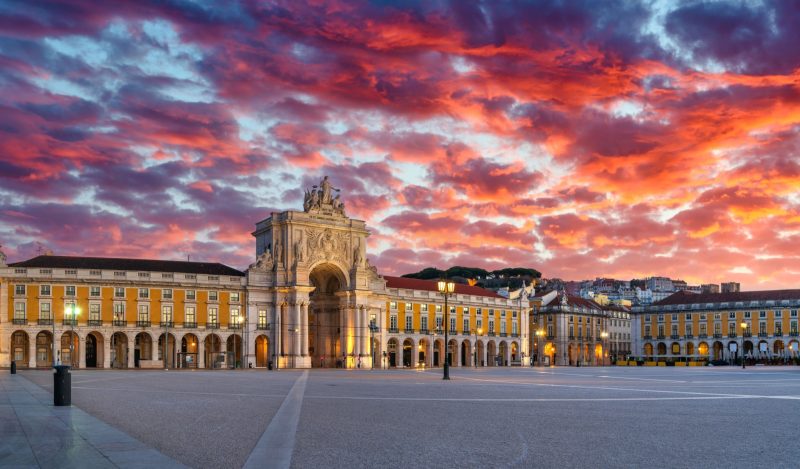It is apparently much easier to tell the truth about state action the farther away it is from home. And hence even the New York Times seems alarmed at the covid lockdowns in Shanghai, and pretending as if nothing like that could happen here even though the whole practice of lockdown the world over was directly copied from the Wuhan model.
“China is meddling with free enterprise as it hadn’t in decades,” says the paper. “The results are familiar to those old enough to remember: scarcity, and the rise of black markets.”
The disruptions are especially difficult for smaller businesses.
A truck driver who asked me to use only his surname, Zhao, has been stuck in his vehicle, unable to work, in a Shanghai suburb since March 28 when the district was locked down. He, along with nearly 60 other truckers, have been drinking from fire hoses, struggling to secure food and without a bathroom to wash up in.
He’s losing sleep, wondering how he will cover his loans: about $2,000 monthly for his truck and about $500 for mortgages, while continuing to support his wife and their two children.
What the chilling article (which likely understates the calamity) does not say: these Shanghai lockdowns are precisely what many of the architects of lockdown theory imagined as the right policy for the US and the entire world in the Spring of 2020. They were brazen about it. Close your business, schools, churches, stay home, stand six feet apart, test constantly but don’t go out, don’t travel, don’t shop unless necessary, no gatherings, live online, and so on it went.
What we see in Shanghai is the fulfillment of the lockdown vision for society, not just for China but for every country, all in the name of virus eradication through social destruction. Now that the chilling reality is presented to us, we see the New York Times – which, please recall, was first out with the demand that we “go medieval” on the virus – distancing itself as much as possible from the idea.
At last, elite opinion sees the downside. I interpret that as victory. We’ve won the lockdown fight…maybe. The more among its advocates who now say “I never favored lockdowns” the more we can be sure that this battle is won, at least rhetorically.
We’ve also won the fight over vaccine mandates, which have been repealed by force of public pressure. It was never supposed to be this way; they were conceived of as a permanent feature of public life. They are mostly gone for now. So too for the preposterous apps that are supposed to carry our vaccine status as a ticket to admission to public life.
These are encouraging victories but just the beginning. The covid response exposed the vulnerabilities of many institutions. It revealed many problems that cry out for solutions, most related to what happened to the US and the world over two years. This is not anywhere near an exhaustive list.
1. Pandemic Response
We apparently agree that lockdowns are not the key to solving a pandemic, though many are still defending the idea. Just today, a new model gained tremendous attention with a claim that many more would have died without lockdowns. A model. They will forever claim this. Some people just cannot let go.
But that still begs the question: what precisely is the role of individuals and public authority in the face of a new pathogen? We need some new consensus on this problem, else lockdowns are going to be deployed by default. They will do it again so long as it remains the only tool in the box, and right now it more or less is.
If we learn from history, the answer is not complicated. In general, it is the same one used in 2014, 2009, 2003, 1984, 1969, 1958, 1942, and 1929, and even 1918 in most places, among other periods. Don’t panic. Public health should investigate and communicate the properties of the pathogen, its spread, prevalence, and severity. Experiment to find the best therapeutics. Go to the doctor if you get too sick. Let our immune systems work and allow herd immunity to develop through normal social functioning, while urging the most vulnerable to stay safe and wait it out.
This is what we always did in the US. Two years ago was different. We tried a new theory and practice and it flopped, catastrophically. Worse, dissenting scientists were aggressively censored, attacked, and smeared, and this happened (we now know) on order from above. It was a time when the only approved science was government science, an experience on par with that which dominated totalitarian countries in the 20th century.
For eons, the presence of disease has been deployed as a cover for despotism, segregation, stigmatization, and even war. It happened in the ancient world and all through the modern era too. Somehow, some way, some countries cobbled together a social contract concerning what we would and would not do during a crisis. That contract was just shredded. We need to put it together again. We are nowhere near coming to terms with the relationship between freedom as we understand it and the presence of pathogens in society.
2. History
There are many mysteries concerning what happened to us over two years. What precisely happened in February 2020, when Anthony Fauci, Peter Dazsik, Francis Collins, and others, went to burner phones and encrypted calls, warning friends and family members of impending disaster, even as they neglected public-health basics like therapeutics and truthful messaging? Why did they do this?
There are so many surrounding gain-of-function research, the use of imprecise PCR technology, the privileging of mRNA shots, the role of Deborah Birx, the CDC’s recommendations concerning plexiglass, distancing, closures, the school closures, the NIH junket to China in mid-February 2020, the push to mandate vaccines, the relationship between Big Tech and Big Government, death misclassifications, exaggerations over hospital capacity, and so much more.
We have a very rough sketch but when all the presumptions of civilized life are suddenly thrown overboard, the public deserves to know the fullness of the question: why?
The history is nowhere near being told in its fullness.
3. Administrative State
The federal district judge in Florida’s decision on the federal mask mandate unleashed far more than was in the lawsuit. It was decided against the government, which is to say that for more than a year, the people who were telling us that we were wrong were themselves in violation of the law. That is an awesome realization.
And yet, there has been widespread media panic about the very idea that a court could overrule a government bureaucracy, as if nothing like this had ever happened before, and as if bureaucracies need not be burdened by any legal authority. Many of us have intuited that the “deep state” believes this to be true, but it was absolutely startling to see the DOJ, CDC, and administration spokespeople say as much. Apparently, they want absolute power, clearly, even dictatorial power.
Is this really the way we want to live, with government bureaucracies making fully autonomous decisions about what we can do in our homes, churches, businesses, and how we engage with neighbors, friends, and family? There is good reason to believe that most people reject this idea. And yet there is an entire layer of government out there, perhaps the most powerful one, that disagrees. This problem needs to be solved.
4. Education
The school closures never made sense: the kids were not vulnerable and the teachers in countries where schools remained open did not die. It would be nice to know how all this happened, who gave the orders, on what basis, how the message spread, how it was enforced, and whether any of the people who did this had thought even for a moment about the consequences of doing this.
The results were cruel but also bizarre. Homeschooling had existed under a cloud for many decades, and suddenly it became mandatory for most people. How did it happen that public schools, the crown jewel of progressive reform dating back to the late 19th century, were so blithely padlocked, in some places for two full years? It’s simply incredible. And the results are everywhere and shocking.
Nonetheless, we surely discovered in the course of this disaster that there are other models of schooling that can readily compete with legacy public schooling that were not up to the task of withstanding the crisis. It’s time for reform, or at least dramatic liberalization to permit more choice: homeschool, private school, hybrid community schools, charter schools, and more flexibility in compulsory schooling laws. We simply cannot just restore the failed status quo ante.
5. Health Care
For many months and up to a year, health care was inaccessible for many people. It became a covid-only service. Health care spending dramatically declined, in a pandemic! How did this happen? Who gave the orders? For months in most places in the US, hospital parking lots were empty. Nurses were furloughed in hundreds of hospitals. Cancer screenings, treatments, checkups, and even childhood vaccinations were not taking place. This happened not only at hospitals but regular health clinics too.
Then there’s dentistry, which for months almost did not exist in this country. Astonishing.
It was a sign of a deeply broken system. Even now, we have a major problem that people are spending vastly more on health services than they ever could consume, mostly through employer-provided plans that keep people deeply fearful of losing their job. Insurance as provided through the “market” is not really competitive since choices are so limited, premiums and deductibles so high, and their acceptance is so spotty.
One bright spot of the pandemic was the liberalization of telemedicine. It’s a good start but mostly it is an illustration of the creativity and good service and price that comes from liberalization of this sector. The entire industry is overly regulated and controlled. It could benefit from real market forces.
And let’s add to this the shocking attack on the freedom of doctors to prescribe treatments to their patients without getting warnings from medical boards acting as proxies for government bureaucrats. How precisely did this come about and what is going to happen in the future to stop this from happening?
The entire pandemic response amounts to a clarion cry: reform and disrupt this entire sector.
6. Politics
In the early 1940s, the administration of Franklin D. Roosevelt offered to what later became the March of Dimes assistance in its fundraising for polio. The foundation refused because they worried about tainted public health concerns with politics. Very wise. There should be a strict separation but that did not happen in 2020 and following. Those who suspect that the entire pandemic response was part of a campaign to drive the president from office are not crazy; there is plenty of evidence to that effect.
And in 2021, we witness overt attempts on the part of the Biden administration to blame the disease on red states where Republicans enjoy majority support. It was an amazing thing to watch unfold, and of course the claims were only temporarily true as the virus migrated to blue states after which the White House shut up.
The entire response was tainted by political motivations from the start. Even from the early lockdowns, Trump trusted advisers who probably had ulterior motives, as they later hinted. Once he came around to the position that society should normalize, it appeared that he was no longer in charge of the response at all and the CDC/NIH was dictating policy with some purpose in mind.
Later, the Biden administration’s push for vaccine mandates and mandatory masks was driven by some political position too: to be seen as anti-Trump regime as an appeal to the base.
There are no easy answers to how to fix this. It is apparent that politics and pathogens do not mix well. Can there be a wall of separation between public health and politics? Maybe that’s a dream but it would seem to be ideal. How to bring it about?
7. Psychology
Brownstone has several top psychologists writing for us and they have all sought to explain the group psychology behind the mass panic. Rightly so. It cries out for explanation. How did we go from a country of seemingly normal-acting people to a wild pack of flagellant germaphobes in a matter of weeks? How can this be prevented in the future?
It was March 12, 2020, just as the panic was rising, when I met in a television studio a therapist who was being interviewed that day. His specialty was in personality disorders extending from trauma. He was utterly distraught because what he saw unfolding that day amounted to an extension of what his patients experience to the whole of society. He was nearly weeping simply because he saw what was coming.
A major problem right now pertains to the mental health of young people.
8. Economics
The disregard of basic economics during the pandemic was shocking. People routinely denounced those who worried about the economic fallout for putting money ahead of health, as if economics and health have nothing to do with each other, as if the delivery of food, the quality of the money itself, and the functioning of markets have nothing at all to do with taking on a health crisis. It was strange: it was as if an entire discipline didn’t matter. And it did not help that the economists themselves fell largely silent.
Here we should include the astonishing thing: Big Tech willingly signed up to be mouthpieces for government priorities for two years, and this continues now. The censorship about which everyone is rightly screaming is directly related. This is not free enterprise. It is something else with an ugly name. It needs to stop. The wall of separation needs to apply here too and it should also address the massive problem of regulatory capture.
The principles of public health and economics share much in common. They are both focused on the general good not a single problem, and not for a short-term win but over the long term. There must be more cooperation here with each side learning from the most competent experts from the other side.
Also a plea: everyone in the social sciences needs to spend more time coming to understand basic cell biology. We should know by now that real life experiences cause many fields to overlap. There need to be intellectual and honesty checks running in both directions.
9. Class Differences
At some point in the middle of March 2020, nearly every top manager of every company in the US received a memo that explained which businesses are essential and which have to close. Many in the professional class took their jobs home and did fine. Others in the working classes were shoved in front of the pathogen to bear the burden of herd immunity and only later told they had to get a vaccine that they didn’t want or need.
Then – and this is truly hard to believe – public venues in major cities begin to close to the unvaccinated. No one seemed to care about the disparate impact of these policies by race, income, and class. Our cities literally became segregated as vast numbers were shut out of restaurants, bars, libraries, museums, and movie theaters. It’s almost too shocking to contemplate.
Would any of this have happened if the Zoom class had an ounce of empathy for the working classes? Doubtful. As it was, major media venues kept urging their readers to stay home and get their groceries delivered, and by whom they never said. They just didn’t care.
Do we still aspire to be a society with mobility in which strict demarcations between people are not enforced by law? We should hope so. But the pandemic response showed otherwise. Something needs to change.
10. Social Philosophy
Finally we come to the biggest problem of all. What kind of society do we want to live in and build? Is it based on the presumption that freedom belongs to all and is the best path for progress and good lives? Or do we want the rights of the people always to defer to the mandarins in the walled-off bureaucracies who give orders and expect only compliance and no challenge to their rule?
This is a huge question, and it is tragic that we are being called upon to ask it at all. It seems as if an entire generation needs to revisit the history of liberty and the Founding documents of the US. More than that, an entire generation needs to become convinced that freedom actually matters, even and especially in a crisis of any sort, whether the arrival of a new pathogen or something else.
Clearly, something had gone wrong long before the pandemic response, some kind of social/cultural loss of confidence that freedom is the best path. We woke one day living in the midst of Schumpeter’s prediction: the blessings of freedom had become so abundant and ubiquitous that they were widely taken for granted and thus did the ruling class become overly tempted to overthrow the source just to see what would happen. The preexisting philosophical nihilism of the before times easily bled into despotism of the last two years. Chesterton said that those who believe in nothing will believe in anything. His point has been proven, and with disastrous results.
So, yes, there are victories all around us: lockdowns for now do not vex us and most mandates are gradually evaporating. But the intellectual, social, cultural, and political reckoning has just begun. It is going to touch every institution and every area of life, and consume the efforts of all of us for at least another generation.
Published under a Creative Commons Attribution 4.0 International License
For reprints, please set the canonical link back to the original Brownstone Institute Article and Author.









